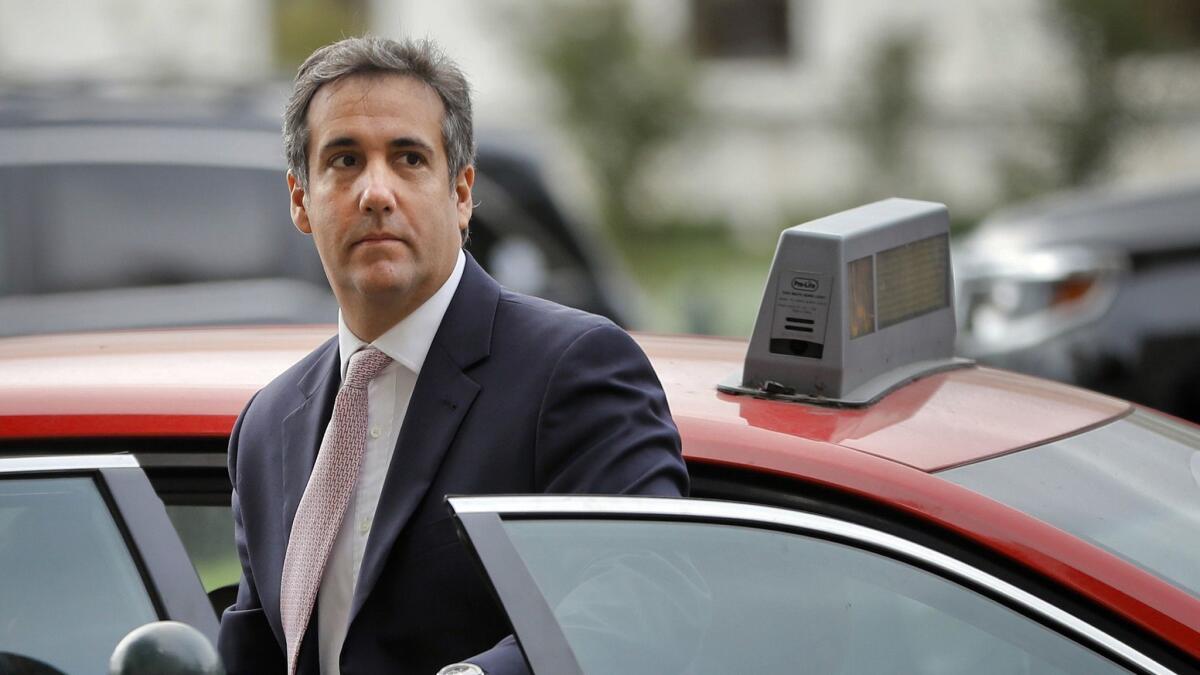Federal prosecutors end hush-money investigation involving Trump

- Share via
WASHINGTON — Federal prosecutors have closed their investigation into hush-money payments arranged by Michael Cohen, President Trump’s former fixer and lawyer, ending what was considered one of the gravest potential legal threats to the president and the company that bears his name.
U.S. District Judge William H. Pauley III revealed the decision on Wednesday in New York as he ordered prosecutors to release search warrants and other documents used during the investigation into Cohen.
“The campaign finance violations discussed in the materials are a matter of national importance,” the judge wrote in his order. “Now that the government’s investigation into those violations has concluded, it is time that every American has an opportunity to scrutinize the materials.”
The hush-money payments were part of an illegal campaign scheme to prevent embarrassing information about Trump from emerging shortly before the 2016 election, and the money was intended to silence two women who said they had slept with Trump years ago.
The National Enquirer, a tabloid run by a Trump ally, paid $150,000 to a former Playboy playmate, Karen McDougal, and Cohen gave $130,000 to a porn star known as Stormy Daniels.
Cohen was later reimbursed through the Trump Organization after the election, and prosecutors said Trump himself directed the scheme, creating the potential for additional prosecutions for violating campaign finance laws because the payments functioned as undisclosed political contributions.
Although Justice Department rules prevent bringing criminal charges against a sitting president, some of Trump’s critics had hoped the Cohen case could lead to an indictment of Trump after he leaves the White House.
However, it appears that Cohen will be the only person charged in connection with the payments. He is serving three years in prison for campaign finance violations and other crimes unrelated to the hush money.
Cohen’s lawyer, Michael Monico, said he was surprised by prosecutors’ decision to close the investigation.
“I thought there was substantial and significant information by which they would be able to bring a case against others,” he said.
The prosecution was an offshoot of the Russia investigation led by then-special counsel Robert S. Mueller III, who provided federal prosecutors in Manhattan with information that they used to build a case against Cohen. He pleaded guilty to eight charges, including tax evasion and bank fraud, on Aug. 21, 2018.
Cohen later pleaded guilty a second time on Nov. 29, 2018, and admitted lying to Congress about pursuing a luxury real estate project in Moscow during the campaign. The effort to build a Trump Tower Moscow, which was abandoned around the time Trump accepted the Republican presidential nomination in mid-2016, was a key storyline in Mueller’s investigation.
The former special counsel is scheduled to testify on Capitol Hill next Wednesday about the Russia probe. Lawmakers are likely to ask about the Moscow project, which remains a topic of interest for the House Intelligence Committee led by Rep. Adam Schiff (D-Burbank).
Pauley’s order requires prosecutors to release search warrants and other documents on Thursday that were drafted more than a year ago in preparation for court-approved searches of Cohen’s home, office and hotel room on April 9, 2018.
Redacted versions of the materials were released in March. Nearly 20 pages in the search warrant addressing what prosecutors called “the illegal campaign contribution scheme” were censored.
When Pauley approved those redactions, he wrote that “wholesale disclosure of the materials would reveal the scope and direction of the government’s ongoing investigation.”
He struck a different tone on Wednesday, denying prosecutors’ request to make less information public.
“The weighty public ramifications of the conduct described in the campaign finance portions warrant disclosure,” he wrote.
Although additional embarrassing disclosures about the hush money scheme may still emerge, the legal threat to Trump and his company appears to have been lifted.
“We are pleased that the investigation surrounding these ridiculous campaign finance allegations is now closed. We have maintained from the outset that the president never engaged in any campaign finance violation,” Jay Sekulow, a lawyer for Trump, said in a statement.
Cohen previously has complained that he was the only person facing charges for the hush money scheme, while Trump, who Cohen said had approved the money and later reimbursed him, was escaping prosecution.
“How come I’m the only one? I didn’t work for the campaign. I worked for him,” Cohen told New Yorker magazine before starting his prison sentence in May. “And how come I’m the one that’s going to prison? I’m not the one that slept with the porn star.”
More to Read
Get the L.A. Times Politics newsletter
Deeply reported insights into legislation, politics and policy from Sacramento, Washington and beyond. In your inbox three times per week.
You may occasionally receive promotional content from the Los Angeles Times.











